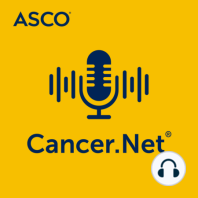6 min listen

Lymphoma Highlights from the 2022 American Society of Hematology Annual Meeting, with Christopher Flowers, MD
Lymphoma Highlights from the 2022 American Society of Hematology Annual Meeting, with Christopher Flowers, MD
ratings:
Length:
9 minutes
Released:
Jan 26, 2023
Format:
Podcast episode
Description
ASCO: You’re listening to a podcast from Cancer.Net. This cancer information website is produced by the American Society of Clinical Oncology, known as ASCO, the world’s leading professional organization for doctors who care for people with cancer. The purpose of this podcast is to educate and to inform. This is not a substitute for professional medical care and is not intended for use in the diagnosis or treatment of individual conditions. Guests on this podcast express their own opinions, experience, and conclusions. Guests’ statements on this podcast do not express the opinions of ASCO. The mention of any product, service, organization, activity, or therapy should not be construed as an ASCO endorsement. Cancer research discussed in this podcast is ongoing, so data described here may change as research progresses. In this podcast, Cancer.Net Associate Editor Dr. Christopher Flowers covers new research in non-Hodgkin lymphoma presented at the 2022 American Society of Hematology Annual Meeting, held December 10-13 in New Orleans, Louisiana. Dr. Flowers is the Chair of the Department of Lymphoma/Myeloma at The University of Texas MD Anderson Cancer Center and was appointed Division Head ad interim of Cancer Medicine in August 2020. View Dr. Flowers’ disclosures at Cancer.Net. Dr. Flowers: Hello and welcome to this Cancer.Net podcast. I'm Dr. Christopher Flowers, professor and chair of the Department of Lymphoma and Myeloma at the University of Texas MD Anderson Cancer Center. And it's my great pleasure to talk to you today about updates in lymphoma from this year's American Society of Hematology meeting in December of 2022. I have a number of disclosures related to my work as a consultant for companies in the development of therapies for lymphoma. I will not talk about agents specifically related to those companies, but 2 companies that overlap with some of the areas that I'll talk about in bispecific antibodies includes Genentech, Roche, and Genmab, as well as research support from those companies for research that is performed at MD Anderson. So this year's American Society of Hematology meeting had a number of highlights. I was very fortunate to be the introducer for one of those key highlights, and that was the abstract presented at this year's plenary session. This was actually the first abstract presented in the plenary session where I introduced the abstract and set the context, and Dr. Martin Dreyling from the German group described the TRIANGLE study. So the TRIANGLE study was a randomized controlled clinical trial, meaning that the trial was performed in a randomized fashion to be able to test 3 particular strategies for patients with mantle cell lymphoma. Mantle cell lymphoma, as many of you may know, is a relatively uncommon form of non-Hodgkin lymphoma. It's a kind of lymphoma that can be quite aggressive, and particularly for younger patients who are suitable for aggressive therapy, the role of autologous stem cell transplantation has been something that's been important for the first-line therapy for mantle cell lymphoma. This study evaluated the use of a standard regimen of giving R-CHOP chemotherapy alternating with R-DHAP chemotherapy. So a chemotherapy regimen that includes Ara-C as their component followed by autologous stem cell transplantation. And it compared using that same regimen to giving it with ibrutinib added to the R-CHOP portion of the chemotherapy, followed by ibrutinib maintenance after the stem cell transplant or another experimental arm that added ibrutinib to the R-CHOP portion of the chemotherapy and gave 2 years of ibrutinib maintenance without stem cell transplantation. I think, importantly, this arm compared to each of those 2 experimental arms versus the standard of care and showed graphically that both of the arms that contained ibrutinib, the BTK inhibitor, looked to have improved failure-free survival compared to the standard stem cell transplant arm. Formal statistical tests were p
Released:
Jan 26, 2023
Format:
Podcast episode
Titles in the series (100)
The Importance of Hydration: In this podcast, we'll review why people with cancer have a higher risk of dehydration, what symptoms to watch out for that may signal dehydration, and offer five simple ways to help keep your body's fluid supply in balance. Quality of Life by Cancer.Net Podcast